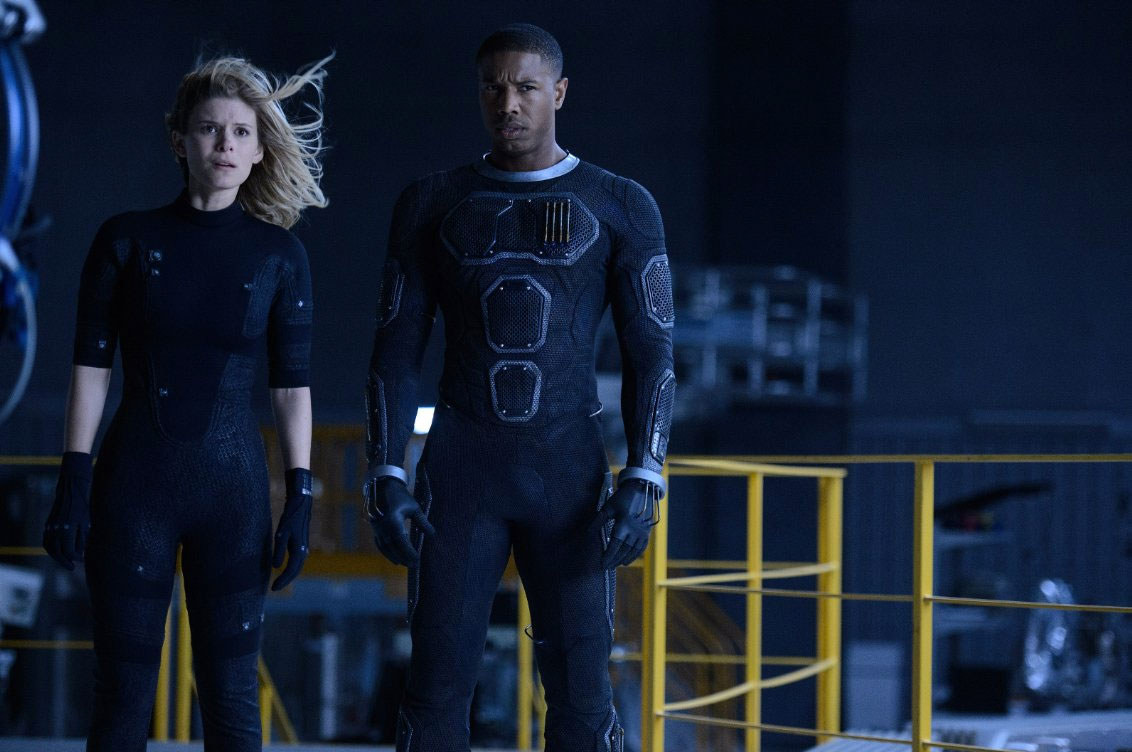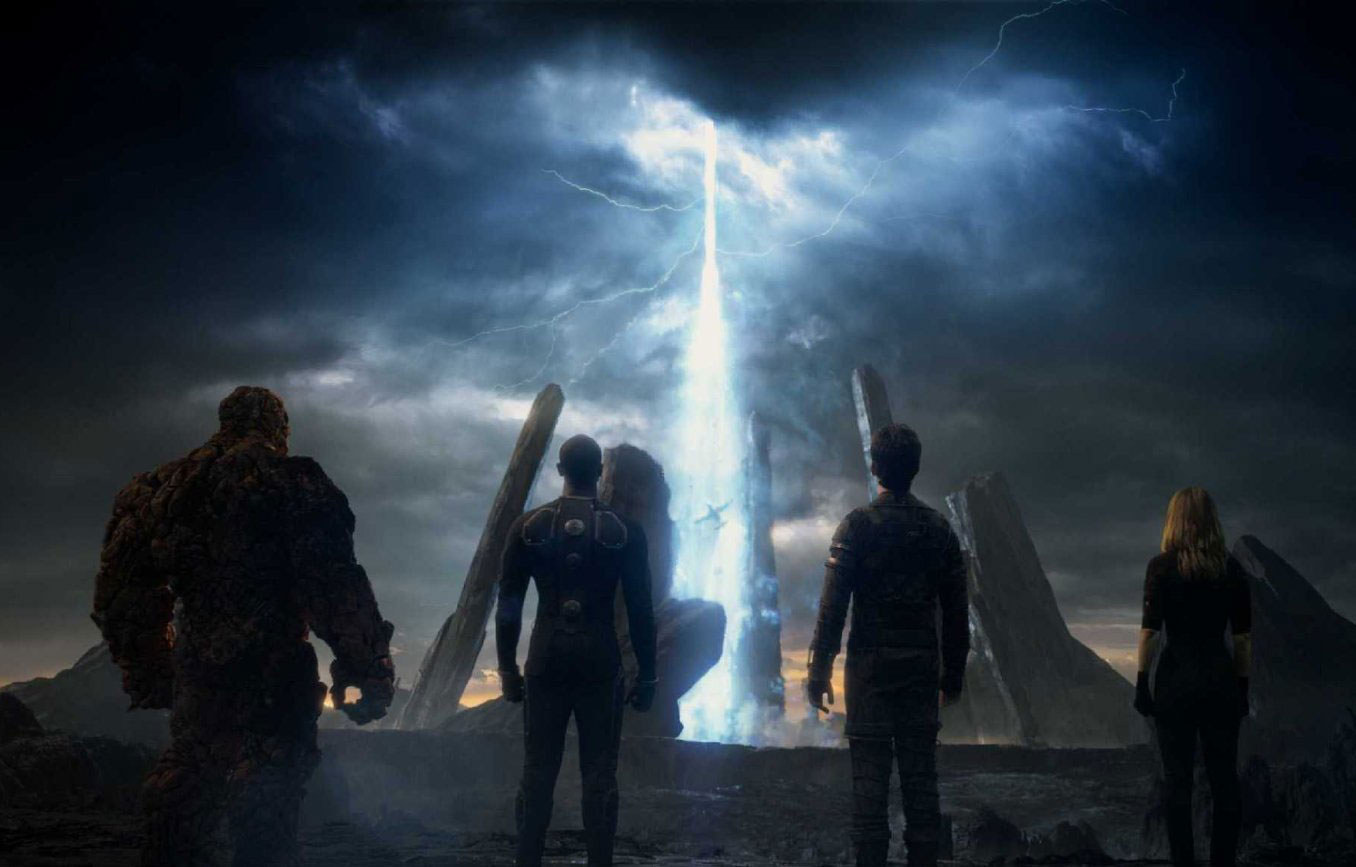
The best idea that the new Fantastic Four has in updating Stan Lee's inaugural superhero team is finding the horror in the transformations inflicted on its characters.
This has always been part of the deal for Ben Grimm (Jamie Bell), who gets the roughest shake in being changed into unrecognizable rock monster The Thing and who, in this incarnation, has to deal with the further indignity of going pantsless. Ben is seemingly fused into a mound of rubble on the floor, flailing to drag his limbs free and extricate himself as a vaguely humanoid form from the mess.
But director Josh Trank finds the disturbing in what's happened to Ben's cohorts as well. Johnny Storm (Michael B. Jordan) first looks like a husk of a human being, a screaming face, panicked, in the midst of unending flames. His adoptive sister Sue (Kate Mara) is glimpsed flickering in and out of visibility beyond her conscious control. And Reed Richards (Miles Teller) wakes in a lab with his limbs elongated to grotesque lengths, as if the joints have been dislocated and the flesh pulled to its limits. Later, he crawls through air ducts, seemingly unaware of how his torso extends, snakelike, behind him.

It's a genuinely creepy take on powers that have always seemed a little old-fashioned, a little hokey, a legacy from an older era in comic bookery in which the demand for awesome-looking ass kicking was different (those catchphrases!). The ability to stretch may never be cool-looking, but Fantastic Four manages to make it look unsettling and kind of gross, which is an accomplishment on its own. It's too bad that it takes an interminable amount of time to get to that point, and what follows is a hasty escalation toward a conclusion that feels generic and confusing at the same time.
It's impossible to pin down where Fantastic Four went off the rails. Trank, who came to the film off found-footage superhero riff Chronicle, and who wrote the screenplay with Simon Kinberg and Jeremy Slater, surely shares a fair amount of responsibility, but the movie also feels roughly reshaped by studio notes and reshoots that are easy to spot thanks to a particularly noticeable wig worn by Mara.
The resulting film combines the worst aspects of gritty reboots with the worst aspects of cartoony, comic book logic. It's a movie that seems to prioritize character development over action, except that the characters never seem to interact and have no clear personalities. It chooses for its emotional core the friendship between Reed and Ben, and then has them spend almost no time together. Its characters are supposed to be both genius scientists and dumb kids. There's a lot of exposition, yet it makes little sense.

Like, how old are these people supposed to be, anyway? Fantastic Four starts in the past with neglected child prodigy Reed (Owen Judge) and neglected tough kid Ben (Evan Hannemann) meeting in elementary school in Oyster Bay in 2007. Then it skips ahead to them as weathered-looking high schoolers at a science fair seven years later, when Reed is recruited by Dr. Franklin Storm (Reg E. Cathey, voice deep enough to test subwoofers) and his daughter Sue to work, or maybe study, at the Baxter Institute. Why the institute is so dependent on the efforts of teenagers and one unstable twentysomething (eventual villain Victor von Doom, played by Toby Kebbell) is unclear, though it's something its investors, headed by Tim Blake Nelson, wonder about as well.
The institute is focused on travel to another dimension that, its head assures, will be key in solving Earth's resource issues, despite the place being your standard sci-fi hellscape. At one point, Franklin gives a speech about his team getting to "fix what my generation broke" that feels like it's underlining an overall mandate to pander to a younger crowd. It's the only way to make sense of a story that attempts to combine montages of somber laboratory research with teen angst. Teller is only four years younger than Ioan Gruffudd was when he played his respected physicist version of Reed in Tim Story's cartoony 2005 Fantastic Four, but like the other main characters, is signaled very strongly not to be a grown-up — call it a testament to the shifting borders of adulthood.
Or to Chronicle. There are swaths of Fantastic Four that feel like Trank is attempting to remake his smartly done directorial debut about accidentally superpowered teens on a grander scale. Doom is the Dane DeHaan character, Reed is Alex Russell, and Michael B. Jordan can still be Michael B. Jordan, I guess. But Chronicle deftly reverse-engineered a superhero saga so that the characters' personalities and home lives guided how they used the gifts onto which they stumbled. For two of its kids, telekinesis and the ability to fly offered more ways to goof around, but for the abused boy who was both the movie's protagonist and its supervillain, they were an eventual means for revenge.

The characters in Fantastic Four have no real personalities — Sue is serious, Reed a bit of a bro, Johnny rebellious, Doom sulky, Ben... nothing much, really, until his transformation into The Thing allows him to be resentful. The movie devotes a long stretch (heh) to the time before the accident that gives the group its powers, and yet these five and the relationships between them never congeal.
And bewilderingly, the best part of any origin story, the one in which the characters learn to use and enjoy their powers, gets consigned to a time skip and a montage, as if that flicker of joy would disrupt whatever the movie's dour aims are. The climax, an incoherent, unintentional live-action restaging of the one in Big Hero 6, sans tears, doesn't shed light on those goals either. What's left is a superhero movie that shows that the most interesting ideas won't get you far if you can't execute them.
